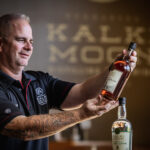Sangar Rum, Owner: MIKE SEHZUE
Visiting Liberia in 2010, Mike Sehzue got to see firsthand the struggle that people of his father’s home country were going through as a result of 14 years of civil war. Challenges were many and the growing pain ran deep. The country was hard at work to rebuild infrastructure, power, and clean systems.
Mike wondered, what would be the best way to help his people and make their lives better. The answer was to help spur the country’s economy. He foresaw a promising opportunity with his family’s sugarcane plantation and 100+ years of beverage production that could be the foundation of a global enterprise to produce and export beverages made from the natural resources rich in West Africa. That is how the idea of Miseh Distilling, a medium-scale distillery that is located in the growing agricultural center of Nimba County, Liberia, evolved. Let’s learn more about him in this interview:
TRL: Who is Mike Sehzue?
Before founding AME Imports/Miseh Distilling, Mike served six years as an Engineer Officer in the U.S. Army. He also developed project management skills as a global project services leader within the oil & gas industry. Later, Mike served as a strategy and operations management consultant focused on operations transformation. He also led a non-profit chapter focusing on entrepreneurial ecosystem building and economic development through entrepreneurship while providing business advisory services to small-medium enterprises in Global South markets. Mike is a certified project management professional, certified global business professional, and Lean Six Sigma Green Belt. Mike is a graduate of the United States Military Academy with a BS in Electrical Engineering, holds an MS in Engineering Management, and is a Rice University MBA graduate.
TRL: What does the rum mean to you? What made you fall in love with rum and when did it happen?
For me, rum means opportunity for economic growth. Despite the abundance of valuable resources, the history of economic challenges in West Africa is well documented. It is my view that the necessary know-how and resources needed to spark much-needed growth and change are currently located in West Africa. The rum is a tangible solution for local-level growth, and I aspire for the brand to grow and serve as an example of the transformation that small business growth can bring to any economy.
TRL: Three essential characteristics that define the rum according to your perspective.
Pure – We use no additives or preservatives to make Sangar Rum from freshly pressed sugarcane juice
Authentic – Over 100 years of sugarcane farming and rum production is the basis for Sangar Rum. We intend to maintain the grassroots nature of Sangar Rum as we continue to grow.
Aspirational – Creating sustainable small business ecosystems is not an easy task. The sugarcane farmers are looking forward to growing their agricultural businesses alongside the growth of Sangar Rum.
TRL: What is the most important contribution you have made to the rum industry?
I hope that I have contributed to the introduction of African rum within the global rum market. I expect African rum products to contribute greatly to the tapestry of flavors within the industry very soon, and I hope that the introduction of Sangar Rum adds variety and uniqueness for rum enthusiasts and casual rum consumers worldwide.
TRL: Benefits that the rum industry has given you.
I’ve had the benefit of meeting some awesome people worldwide through the rum industry. In my experience, meeting with people over a good rum drink has a way of building good relationships.
TRL: What’s another thing you are passionate about, in addition to rum? Why?
In addition to rum, I’m passionate about economic empowerment. I’m fortunate to be able to work in the rum industry to initiate economic empowerment for farmers and small businesses. I believe that the core source of the difficulties in our world is driven by the lack of economic opportunity. I intend to work to stimulate increased trade, whether rum or otherwise, for the entirety of my working career.
TRL: What is your favorite place for drinking rum?
My favorite place for drinking rum is at the beach. It doesn’t matter which beach it is. There’s something about enjoying a good rum drink with a large body of water that’s very gratifying.
TRL: Why is it important to educate the rum consumer?
It is very important to educate the consumer so that the consumer knows what they are tasting. It is difficult for a casual consumer to distinguish various rum categories on taste alone. Educating the consumer allows the consumer to understand the story of the product, and also allows the educator to make a new connection.
TRL: How can the rum contribute to improving the crisis in some countries?
If done properly, rum can contribute to the transformation of communities in crisis especially from communities that lack access to global trade. Building the rum value chains can create sustainable opportunities for vendors and service providers.
TRL: Is the commitment to sustainable development the key to success for the permanence of the rum industry in the world? Why?
Yes, absolutely. Beginning with the sustainable development of agriculture in places where sugarcane grows, changes in the climate may affect the available volume of rum (gasp!). A commitment to sustainable development in value chains from farming to production and market entry is critical to the continued growth of the rum industry.
TRL: Why is the role of the bartender important in the rum industry?
The bartender is often the primary storyteller of the brand. The bartender can serve as a gatekeeper of sorts, and the bartender’s ability to create cocktails and recommend particular brands is a powerful difference-maker within the rum industry.
TRL: How can people learn more about you? Website? Social media page?
About The Author
Journalist, Master's Degree in Management and Cultural Policies, Community Manager, Radio Host with a Diploma in Tourism Journalism. Product Manager at The Rum Lab.





